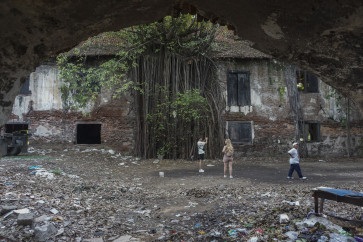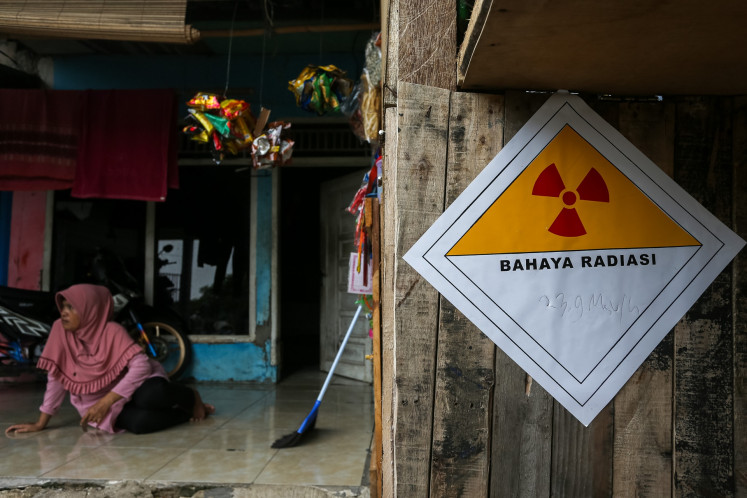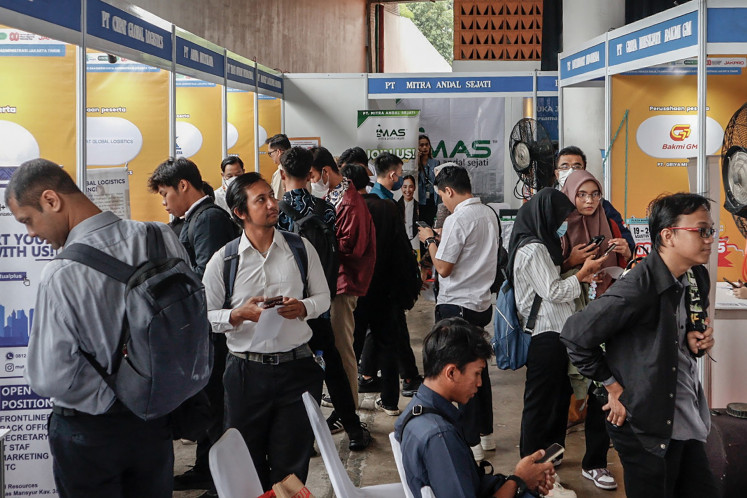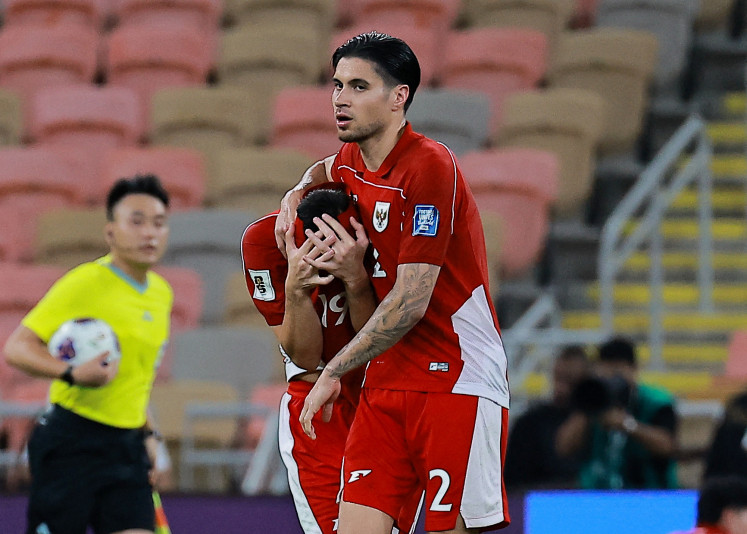Popular Reads
Top Results
Can't find what you're looking for?
View all search resultsPopular Reads
Top Results
Can't find what you're looking for?
View all search resultsSeeking credible PSSI chief
The malaise plaguing Indonesian soccer is partly over, but tough times still lie ahead
Change text size
Gift Premium Articles
to Anyone
T
he malaise plaguing Indonesian soccer is partly over, but tough times still lie ahead. On April 4, FIFA formed the normalization committee to run the Indonesian Soccer Association’s (PSSI) daily activities and to administer its emergency congress scheduled for May 20 to elect a new chairman and board members.
The world soccer governing body appointed Agum Gumelar, a retired Army general and former PSSI chairman, as the committee leader in a move seen as a “death knell” for deposed PSSI chief Nurdin Halid and his executive board members. Youth and Sports Ministry on behalf of the Indonesian government, previously announced its vote of no-confidence against Nurdin’s leadership.
FIFA deemed Nurdin’s regime no longer legitimate because of three fundamental failures. His leadership failed to fully adopt the FIFA’s statute on the matter of the criminal record of PSSI chairman aspirants, though the indicated manipulation of the statute was not clearly stated. He was also regarded as unable to hold the PSSI congress in March this year. The last strike was his incompetence in dealing with the breakaway Indonesian Premier League (IPL).
FIFA made the right decision because there were no signs of immediate solutions to the deepening problems facing the PSSI chairmanship, which, in turn, put national soccer at stake. Efforts to help the two opposing camps settle their differences did not bear fruit as evidenced by the congress in Pekanbaru, which turned violent.
It is better to assess the emergency committee chaired by Agum as a prescription to help the PSSI recuperate and find new momentum to restore public faith and furthermore the country’s pride at an international level, as The Jakarta Post stated in its editorial “PSSI reform kick” on April 7, 2011.
Support from all parties must go to Agum, as he has pledged to reconcile factions within the national soccer community, between those in favor and those against Nurdin and between PSSI-sanctioned Indonesian Super League (ISL) and the breakaway IPL.
We do hope the normalization committee is able to uphold the spirit of fair play and allow public scrutiny in the selection of a new PSSI leader who must at least be familiar with the business as the government will ban professional clubs from receiving donations from regional budgets (APBD) starting in 2012.
Indonesian soccer is in dire need of not only entrepreneurial figures but also figures with the moral commitment and sense of responsibility to tackle, at least, two major agendas: promoting transparency in the way national soccer is managed and running competitions or leagues within the framework of developing national soccer.
Those interconnected agendas require comprehensive-integrated responses from the future PSSI chairman and board members for the sake of national interest and pride. Running clubs and rolling competitions or leagues without the backing of regional budgets are real challenges, not only for the next PSSI chairman but also for clubs. Their entrepreneurial skills are urgently needed, as history has taught.
Early in 1980s, the PSSI ran a professional league called the Galatama (Liga Sepak Bola Utama or the Primary Soccer League) featuring clubs funded by public, state and private companies and corporations, but it proved unsuccessful. Many of the clubs withdrew and dissolved for a number of reasons.
Only a handful survived and are still present in the current top-tier league, such as Pelita Jaya, Arema Indonesia and Semen Padang. The others chose only to live as memories due to unlucky factors ranging from rampant match-fixing practices to the inability to cope with the mounting operational costs and increasing players’ salaries.
On match days, the stadiums were frequently nearly empty. By contrast stadiums were fully-packed for matches between semi-professional clubs funded by regional budgets known as Divisi Utama Perserikatan, which was also administered by the PSSI.
In 1994, the PSSI dissolved Galatama, and the surviving clubs competed with the semi-professional clubs under a new league format called Ligina (Liga Indonesia or The Indonesian League). In 1998, Ligina stalled because of the political upheaval.
In the post-1998 era of regional autonomy, the influx of foreign players — at first mainly from Africa and South America, followed by European coaches and Asian, Australian and even Caribbean players — has brought stadiums back to life.
Acting either as the chairman, manager or patron of local clubs, regional heads view soccer as an effective vehicle to achieve short-term political interests.
But soccer was not a robust business at that point, as club bosses used club budgets as they pleased for political and personal interests and without accountability or public scrutiny. The money was mostly spent on hiring foreign players and coaches rather than on developing young, local talent for the sake of instant success. It comes as no surprise that Indonesia fails to perform well on an international level despite its entertaining league.
Simon Kuper and Stefan Szymanski — the world’s leading writers on soccer and sport economists who wrote Soccernomics — say Indonesian soccer may not be a business at all.
In order to bring changes, transparency in the PSSI and club management and on the soccer field is foremost, apart from entrepreneurship of those involved in the soccer business.
It’s the right time for the next PSSI chairman and his team, the clubs and the entire Indonesian soccer community to promote healthy competition. Building a strong national team is not an instant process but it does take time.
As a start, transparency in club management, well-structured training and well-organized leagues
involving all potentials without having to rely on regional budgets must prevail.
The writer is a freelance editor and media consultant.










